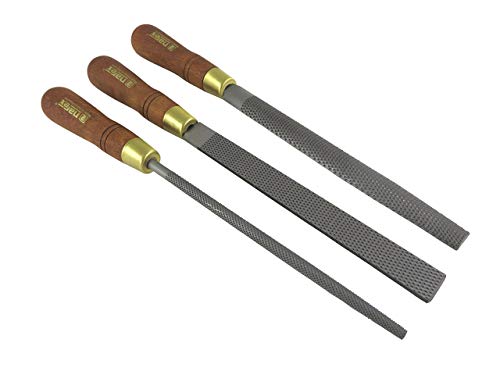If you're looking for a guitar that feels and sounds natural in your hands, then you might want to consider investing in a guitar with a wooden neck. The type and quality of wood used for the neck can significantly affect the vibration and tone of the guitar, making it a crucial factor to consider when purchasing a guitar.
Before purchasing a guitar with a wooden neck, readers should consider their budget, experience level, and musical preferences. The price of a guitar can greatly vary depending on the type and rarity of the wood used for the neck. Moreover, beginners may prefer a more affordable and versatile guitar, while experienced players may want a specific type of tone that only certain woods can produce.
Are you curious about the different types of woods used for guitar necks? Which woods produce the warmest tones, and which ones have the most sustain? How do the size and shape of the neck affect the playability of the guitar? Understanding these factors can help you make an informed decision when buying a guitar with a wooden neck. Whether you're a seasoned musician or a beginner, choosing a guitar with the right wooden neck can make a significant improvement in your playing experience.
10 Best Wood For Guitar Neck
| # | Product Image | Product Name | Product Notes | Check Price |
|---|---|---|---|---|
|
1
|
It is ideal for replacing the neck of an electric guitar with 24 frets and a 25.5 inch scale length.
|
|
||
|
2
|
Ideal for creating high-quality guitar necks due to its strength and durability.
|
|
||
|
3
|
This product is ideal for building a custom electric guitar with a mahogany wood neck and rosewood fretboard.
|
|
||
|
4
|
Ideal for replacing the neck of an electric guitar with an unfinished 22-fret maple or mahogany wood option.
|
|
||
|
5
|
This product is ideal for those who need an unfinished replacement guitar neck with a maple wood fretboard and 24 frets.
|
|
||
|
6
|
This product is ideal for musicians who want an acoustic-electric guitar with superior sound quality and a comfortable neck shape.
|
|
||
|
7
|
This product is ideal for touching up scratches or chips on vintage amber-tinted surfaces.
|
|
||
|
8
|
Ideal for shaping and smoothing wood surfaces in cabinet making and woodworking projects.
|
|
||
|
9
|
Ideal for replacing guitar necks with a 24-fret, 25.5 inch maple wood construction and vine inlay design for ST Strat model.
|
|
||
|
10
|
The product is ideal for securely holding and working on guitars during repair or maintenance tasks.
|
|
1. Maple 24-Fret Guitar Neck Replacement
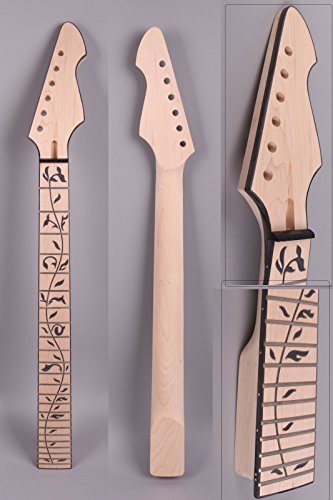
Upgrade your guitar with the Yinfente 24 Fret Electric Guitar Neck. With a 42mm nut width and 56mm heel width, this neck is designed for a comfortable playing experience. The 24 frets and 25.5-inch length make it perfect for shredding solos and hitting those high notes.
Crafted from high-quality maple wood, the neck features a beautiful vine inlay on the fretboard. The normal black nut and truss rod installed at the headstock make it easy to adjust the neck to your desired playing preference. The 9-10mm tuner peg hole diameter and 26mm heel depth, including fretboard, ensure a seamless installation on most guitar bodies.
This package includes one guitar neck with a Jackson headstock design, maple wood neck, and maple wood fretboard with vine inlay. Upgrade your guitar and take your playing to the next level with the Yinfente 24 Fret Electric Guitar Neck.
- High-quality maple wood construction ensures durability and longevity
- Vine inlay on the fretboard adds a beautiful touch to the design
- 24 frets and 25.5-inch length make it perfect for shredding solos and hitting high notes
- Truss rod installed at the headstock allows for easy adjustment to playing preferences
- Compatible with most guitar bodies for a seamless installation
- – Package only includes one guitar neck, additional parts required for installation
2. Honduran Mahogany Neck Blanks 35 X 3 X 1 Inches
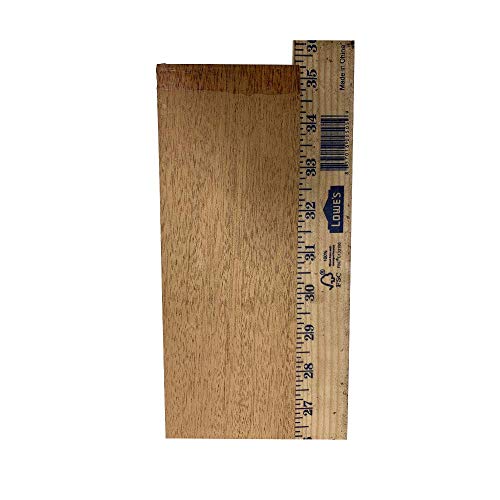
Introducing the premium quality Swietenia Macrophylla wood board, perfect for all your woodworking needs. This board measures 35 x 3 x 1 inches (889 x 76.2 x 25.4 mm) and has been air dried to achieve a moisture content of 8-10%. This ensures that the board is stable and ready to use for your projects.
The Swietenia Macrophylla wood is known for its exceptional durability, strength, and resistance to decay. It is also highly valued for its beautiful grain patterns and natural luster. This makes it a great choice for both functional and decorative projects.
This board is carefully crafted from the highest quality Swietenia Macrophylla wood and is sure to last for years to come. Plus, with free shipping, it's a great value for your money. Order now and start creating!
- Premium quality Swietenia Macrophylla wood
- Exceptional durability, strength, and resistance to decay
- Beautiful grain patterns and natural luster
- Stable and ready to use with 8-10% moisture content
- Great choice for both functional and decorative projects
- Carefully crafted to last for years to come
- Free shipping for added value
3. Mahogany Firebird Electric Guitar Neck Kit
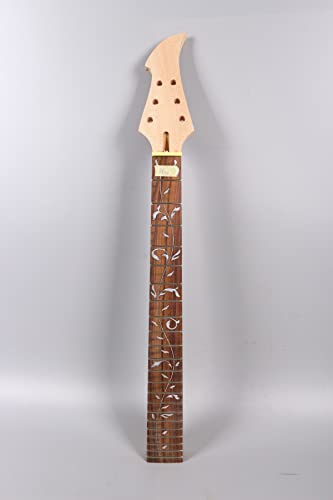
Upgrade your guitar with this high-quality Mahogany wood guitar neck. It features a 22-fret, 24.75-inch scale length, and an unfinished design that allows you to customize its finish to your preference. The rosewood guitar fretboard features a beautiful real vine inlay, adding an elegant touch to your instrument.
The bolt-on heel and 42mm nut width offer a secure and comfortable grip for your hand, while the 55-56mm heel width ensures a perfect fit for your guitar. The C profile with a 12-inch fretboard radius provides a smooth and effortless playing experience, allowing you to play for hours without any discomfort.
This Mahogany wood guitar neck is perfect for DIY electric guitar neck replacement and is designed with a firebird head that adds a unique and stylish look to your guitar. Upgrade your guitar's sound and look with this high-quality guitar neck replacement today!
- High-quality Mahogany wood construction for durability and excellent sound
- 22-fret, 24.75-inch scale length and unfinished design for customization
- Real vine inlay and rosewood guitar fretboard for an elegant and unique look
- Bolt-on heel and 42mm nut width for a secure and comfortable grip
- C profile with a 12-inch fretboard radius for a smooth and effortless playing experience
- Firebird head design for a stylish and unique look
- – May require professional installation for those unfamiliar with guitar neck replacement
- – Unfinished design may require additional work to achieve desired look
4. Yinfente Electric Guitar Neck Unfinished 22 Fret For Electric Guitar Replacement Maple Mahogany Wood
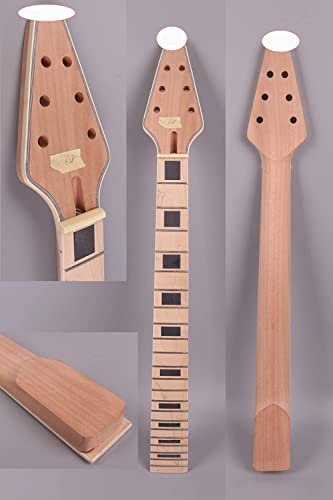
Upgrade your guitar with this high-quality Mahogany wood guitar neck and Maple wood guitar fretboard. This DIY Electric Guitar Neck features a 22 Fret, 24.75 Inch bolt on heel design that provides excellent stability and playability. The truss rod at the headstock allows for easy adjustments and customization to suit your playing style.
The binding headstock and white fretboard binding give this guitar neck a classic and stylish look. It also features a normal nut and a 42mm nut width, making it suitable for a wide range of guitars. The bolt on style makes it easy to install and replace on your guitar.
This guitar neck comes with a package list that includes 1 guitar neck. Upgrade your guitar with this high-quality guitar neck and experience better playability and sound quality.
- High-quality Mahogany wood and Maple wood materials for durability and sound quality
- 22 Fret, 24.75 Inch bolt on heel design for excellent stability and playability
- Truss rod at the headstock for easy adjustments and customization
- Classic and stylish design with binding headstock and white fretboard binding
- Normal nut and 42mm nut width suitable for a wide range of guitars
- Easy to install and replace with bolt on style
5. Yinfente 24 Fret Maple Wood Guitar Neck.
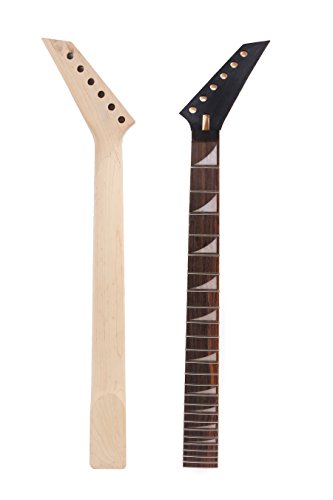
Upgrade your electric guitar with the Yinfente 24 Fret Electric Guitar Neck. This neck boasts a 42.5mm nut width and a 56mm heel width, providing ample space for your fingers to navigate the fretboard. The 24 frets and 25.5 inch length, coupled with the Jackson headstock, make this neck perfect for shredding solos and playing intricate melodies.
The neck is made from high-quality maple wood, which offers durability and a bright sound. The fretboard is made from a combination of maple and rosewood, providing a smooth playing surface with a warm tone. The shark tooth inlay adds a touch of style to the neck, making it stand out from the crowd.
The Floyd Rose locking nut ensures that your strings stay in tune even during intense playing sessions. The truss rod, installed at the headstock, allows you to adjust the neck's curvature to your liking. The 9-10mm tuner peg hole diameter and 26mm heel depth, including the fretboard, make this neck compatible with most electric guitars.
Upgrade your guitar's playability and sound with the Yinfente 24 Fret Electric Guitar Neck. Package includes 1 guitar neck.
- 24 frets and 25.5 inch length make this neck perfect for shredding solos and intricate melodies
- High-quality maple wood offers durability and a bright sound
- Floyd Rose locking nut ensures strings stay in tune during intense playing sessions
- Truss rod installed at headstock allows for easy curvature adjustment
- Compatible with most electric guitars
- – May require professional installation
- – No instructions included
6. Martin Road 000-10e Acoustic-Electric Guitar: Performance Ready
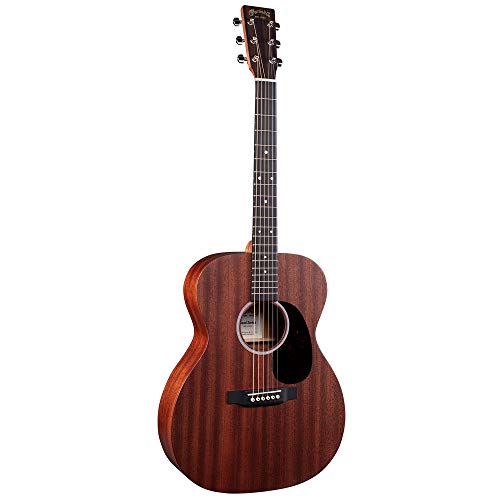
The Martin 000-10E Road Guitar is a professional acoustic-electric guitar crafted from Sapele wood that offers versatility in its sound. The guitar can produce midrange, light, and bright performances with ease, thanks to its Fishman MX-T electronics. The auditorium body style complements the solid wood construction and enhances the melodic sounds produced by the guitar, offering excellent balance. The guitar boasts a full Sapele construction with a satin finish that looks as captivating as it sounds. It features a mortise and tenon neck joint, scalloped X-brace, high-performance tapered neck, and chrome-enclosed gear tuners that make it a superior-looking guitar. Martin’s Road Series of guitars are handmade from the highest-quality wood, ensuring they stand up to late-night jams, long studio sessions, and plenty of strumming or picking. The solid wood acoustic-electric guitars deliver unique designs, professional sounds, and enjoyable playing. The Martin 000-10E Road Guitar delivers enhanced playability that makes playing a pleasure, no matter your experience or skill level. Whether you’re playing rock, country, folk, bluegrass, or jazz, this guitar delivers a natural playing experience you will love. Martin’s superior guitar and string products remain the choice of musicians around the world for their unrivaled quality, craftsmanship, and tone. The Martin 000-10E Road Guitar is the real deal, not an imitation.
- The guitar's Sapele construction offers versatility in its sound, making it suitable for midrange, light, and bright performances.
- The auditorium body style complements the solid wood construction and enhances the melodic sounds produced by the guitar, providing excellent balance.
- The full Sapele construction with a satin finish, mortise, and tenon neck joint, scalloped X-brace, high-performance tapered neck, and chrome-enclosed gear tuners make the guitar look as captivating as it sounds.
- The guitar is handmade from the highest-quality wood, ensuring it stands up to late-night jams, long studio sessions, and plenty of strumming or picking.
- The guitar delivers enhanced playability that makes playing a pleasure, no matter your experience or skill level.
- The guitar delivers a natural playing experience that is suitable for playing rock, country, folk, bluegrass, or jazz.
- Martin’s superior guitar and string products remain the choice of musicians around the world for their unrivaled quality, craftsmanship, and tone.
7. Colortone Touch-Up Marker, Vintage Amber Tinted Lacquer
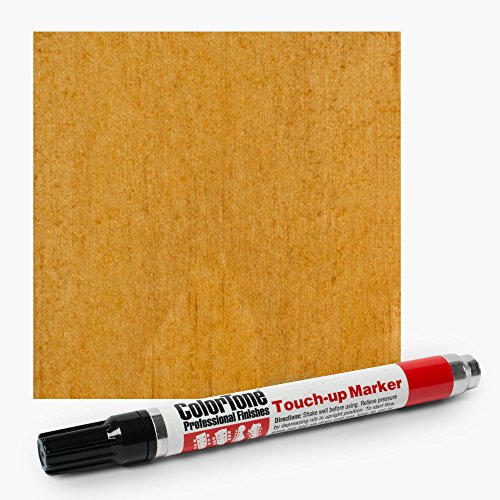
The genuine nitrocellulose guitar lacquer markers are perfect for repairing minor finish dings and scratches. The Vintage Amber tint is transparent, making it ideal for touching up sunbursts and finishes where the wood grain shows through. The markers are convenient and easy to use, with no need for brushing or spraying. Before attempting to repair your guitar, experiment with the markers on scrap wood to get a feel for their flow and application. It is important to note that relieving the pressure built up from shaking the pen prior to use is crucial. This can be done by pressing down on the tip with the pen in an upright position, which will prevent the pen from flooding your work with excess lacquer.
Using these genuine nitrocellulose guitar lacquer markers will give your instrument a professional-looking finish. The markers are perfect for those who want to repair their guitars at home without having to go to a professional luthier. The Vintage Amber tint is an excellent choice for those who want to touch up sunbursts and finishes where the wood grain is visible. The markers are also very easy to use, and there is no need for any special tools or equipment. Whether you are a professional musician or just someone who loves playing the guitar, these markers are a must-have in your toolkit.
The nitrocellulose guitar lacquer markers are a great investment for those who want to keep their guitars looking like new. The Vintage Amber tint is transparent and goes well with most finishes. The markers are also very easy to use, and you don't need any special skills or experience to use them. Before using them on your guitar, it is recommended to practice on scrap wood to get a feel for their flow and application. With a little bit of practice, you will be able to repair minor finish dings and scratches like a pro.
- Convenient and easy to use
- Ideal for touching up sunbursts and finishes where the wood grain shows through
- Professional-looking finish
- No need for any special tools or equipment
- Suitable for both professionals and amateurs
- Transparent Vintage Amber tint goes well with most finishes
- – May not be suitable for major repairs
- – May require some practice and experimentation before use
8. Maple Vine Electric Guitar Neck Replacement
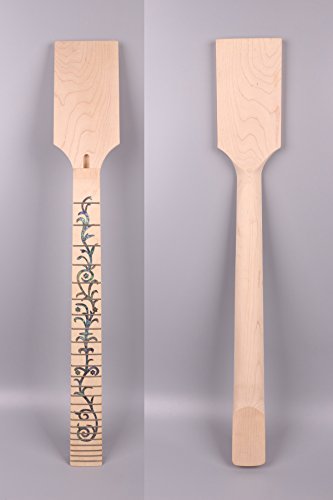
Introducing a high-quality guitar neck made of durable maple wood, perfect for DIY electric guitar projects. The neck features a maple fretboard with a stunning vine inlay that adds a touch of elegance to the overall design. The nut size measures 42mm, while the heel size is 56mm, providing a comfortable grip and easy access to the upper frets. With 24 medium jumbo size frets, this guitar neck offers a wide range of tonal possibilities, perfect for any playing style. The paddle headstock comes with a truss rod installed, ensuring proper neck alignment and adjustment. This guitar neck is a must-have for any guitar enthusiast looking to customize their instrument to their preferences. The package includes one guitar neck, ready to be installed onto your guitar body.
Upgrade your guitar with this high-quality maple wood neck. With a 42mm nut and 56mm heel, this neck is comfortable to grip and easy to play. The vine inlay on the maple fretboard adds a touch of elegance to the overall design. With 24 medium jumbo size frets, this neck offers plenty of tonal possibilities for any playing style. The paddle headstock comes with a truss rod installed, ensuring proper neck alignment and adjustment. Perfect for DIY electric guitar projects, this neck is a great addition to any guitar enthusiast's collection.
Crafted from durable maple wood, this guitar neck is perfect for DIY electric guitar projects. The vine inlay on the maple fretboard adds a touch of sophistication to the overall design. With a 42mm nut and 56mm heel, this neck offers a comfortable grip and easy access to the upper frets. The 24 medium jumbo size frets provide a wide range of tonal possibilities for any playing style. The paddle headstock comes with a truss rod installed, ensuring proper neck alignment and adjustment. Upgrade your guitar with this high-quality guitar neck and take your playing to the next level.
- Made of durable maple wood for long-lasting use
- Maple fretboard with vine inlay adds a touch of elegance to the design
- 42mm nut and 56mm heel provide a comfortable grip and easy access to the upper frets
- 24 medium jumbo size frets offer a wide range of tonal possibilities
- Paddle headstock with truss rod installed ensures proper neck alignment and adjustment
- Ideal for DIY electric guitar projects
- – May not fit all guitar bodies, check compatibility before purchasing
9. Stewmac Guitar Repair Vise
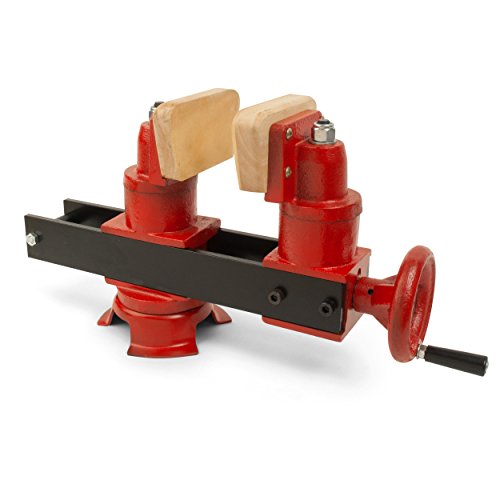
The heavy-duty steel construction of this Guitar Repair Vise is perfect for securely holding the tapered angles of a neck without the need for shims. The vise rotates full-circle for comfortable access and has a fast-crank handwheel with roller bearings for smooth opening/closing. It also features custom hardwood jaws with protective urethane surfaces and nylon-core adjustable tension nuts that control 360° jaw rotation. The vise comes with installation instructions to make set up easy and hassle-free.
This Guitar Repair Vise is a must-have for any guitar repair enthusiast. Its sturdy construction and easy-to-use features make it a reliable tool for holding guitars securely in place during repairs. The custom hardwood jaws with protective urethane surfaces ensure that guitars are not damaged during repairs, while the fast-crank handwheel with roller bearings makes it easy to adjust the vise to the desired angle. The nylon-core adjustable tension nuts control 360° jaw rotation, allowing for precise positioning of the guitar during repairs. Overall, this is a well-built and reliable tool that will make guitar repairs a breeze.
If you're looking for a high-quality guitar repair vise, this is definitely worth considering. Its heavy-duty steel construction and fast-crank handwheel make it easy to use, while the custom hardwood jaws with protective urethane surfaces ensure that guitars are not damaged during repairs. The vise also rotates full-circle, making it easy to access all areas of the guitar. The nylon-core adjustable tension nuts control 360° jaw rotation, allowing for precise positioning of the guitar during repairs. The vise comes with installation instructions, making it easy to set up and use right away.
- Heavy-duty steel construction
- Rotates full-circle for comfortable access
- Fast-crank handwheel with roller bearings for smooth opening/closing
- Custom hardwood jaws with protective urethane surfaces
- Nylon-core adjustable tension nuts control 360° jaw rotation
- Holds the tapered angles of a neck securely without needing any shims
- Installation instructions included
Best Wood For Guitar Neck FAQs
How do different cuts of wood, such as quartersawn or flatsawn, impact the strength and stability of a guitar neck?
The way wood is cut can have a significant impact on the strength and stability of a guitar neck. Quartersawn wood is cut perpendicular to the growth rings, resulting in a stronger and more stable piece of wood. This is because the growth rings run parallel to the surface of the wood, providing more consistent grain patterns and reducing the likelihood of warping or twisting over time.
On the other hand, flatsawn wood is cut parallel to the growth rings, resulting in a more visually appealing grain pattern but a less stable piece of wood. This is because the growth rings run perpendicular to the surface of the wood, creating irregular grain patterns that can lead to warping or twisting over time.
In terms of guitar necks, quartersawn wood is typically preferred due to its superior strength and stability. This is especially important for guitar players who perform frequently or travel frequently, as changes in temperature and humidity can cause wood to expand or contract, leading to potential damage or intonation issues.
Overall, the choice of wood and how it is cut can have a significant impact on the quality and longevity of a guitar neck.
How does the choice of wood for a guitar neck affect its tone and playability?
The choice of wood for a guitar neck can have a significant impact on both the tone and playability of the instrument. The neck wood affects the resonance and sustain of the guitar, as well as the overall feel of the neck in the player's hands.
Traditionally, maple and mahogany are the most commonly used woods for guitar necks. Maple is known for its bright tone and sustain, while mahogany is valued for its warmth and depth. Other woods, such as rosewood and ebony, are also used for necks and can provide unique tonal characteristics.
The density and stiffness of the wood can also affect the playability of the guitar. A denser wood, such as maple, can provide a more stable and rigid neck, while a less dense wood, such as mahogany, can offer a more flexible and responsive feel. The shape and thickness of the neck, as well as the fretboard material, can also play a role in the overall playability of the instrument.
Ultimately, the choice of wood for a guitar neck is a matter of personal preference and can greatly impact the sound and feel of the instrument. Guitarists should experiment with different woods and neck shapes to find the combination that best suits their playing style and desired tone.
What are the pros and cons of using different types of wood for guitar necks?
There are various types of wood that can be used for guitar necks, each with its own unique characteristics that can affect the sound and playability of the instrument.
One of the most commonly used woods for guitar necks is maple. Maple has a bright, snappy tone and is known for its stability and durability. It is also relatively easy to work with and can be finished in a variety of ways. However, some players find that maple can be too bright and lacks the warmth and depth of other woods.
Another popular choice is mahogany, which is known for its warm, rich tone and excellent sustain. Mahogany is also a strong and stable wood, making it a good choice for players who prefer a heavier neck. However, some players find that mahogany can be too heavy and dampen the guitar's resonance.
Other woods commonly used for guitar necks include rosewood, ebony, and walnut. Rosewood is known for its complex, harmonically rich tone, while ebony is prized for its tight and focused sound. Walnut is a relatively lightweight wood that offers a balanced tone with good sustain.
In terms of cons, using different types of wood for guitar necks can result in a higher cost for materials and labor. Additionally, certain woods may require more maintenance or specialized care to keep them in good condition.
Overall, the choice of wood for a guitar neck ultimately comes down to personal preference and the desired sound and feel of the instrument. It's important for players to experiment with different woods and to consider the pros and cons of each option before making a decision.
What factors should be considered when selecting a specific type of wood for a guitar neck, such as cost, availability, and durability?
Selecting the right type of wood for a guitar neck is crucial to ensure the instrument's longevity, playability, and overall sound quality. There are several factors that one should consider when choosing the wood for guitar neck, including cost, availability, and durability.
Cost is an important consideration when selecting wood for a guitar neck, as it can significantly affect the instrument's overall cost. Therefore, it is essential to determine the budget before making a purchase. Some of the most popular woods used for guitar necks are maple, mahogany, and rosewood, which vary in terms of price.
Availability is another important factor when selecting wood for a guitar neck. Some types of wood may be difficult to find or may only be available in certain regions. Therefore, it is important to consider the location and accessibility of the wood before making a purchase.
Durability is also a crucial factor when selecting wood for a guitar neck. The neck of a guitar is under constant pressure and tension, so it must be able to withstand the stress without warping or cracking. Maple, mahogany, and rosewood are all known for their durability, making them popular choices for guitar necks.
In summary, when selecting wood for a guitar neck, it is essential to consider cost, availability, and durability. By taking these factors into account, one can choose the right wood that provides a quality sound and lasts for years to come.
What types of wood are commonly used for guitar necks?
Guitar necks play a crucial role in determining the overall sound and feel of a guitar. As a result, choosing the right type of wood for the neck is essential for achieving the desired tone and resonance. Some of the most commonly used woods for guitar necks include maple, mahogany, rosewood, ebony, and walnut.
Maple is a popular choice due to its hardness and bright, crisp tone. It is often used for necks on electric guitars. Mahogany, on the other hand, is a softer wood that produces warmer tones and is often used for acoustic guitar necks. Rosewood and ebony are also commonly used for their durability and tonal qualities. Walnut is another option that provides a balanced tone and can be used for both electric and acoustic guitar necks.
Ultimately, the choice of wood for a guitar neck depends on personal preference and the desired sound. Each type of wood has its own unique characteristics that contribute to the overall tone and feel of the guitar.


